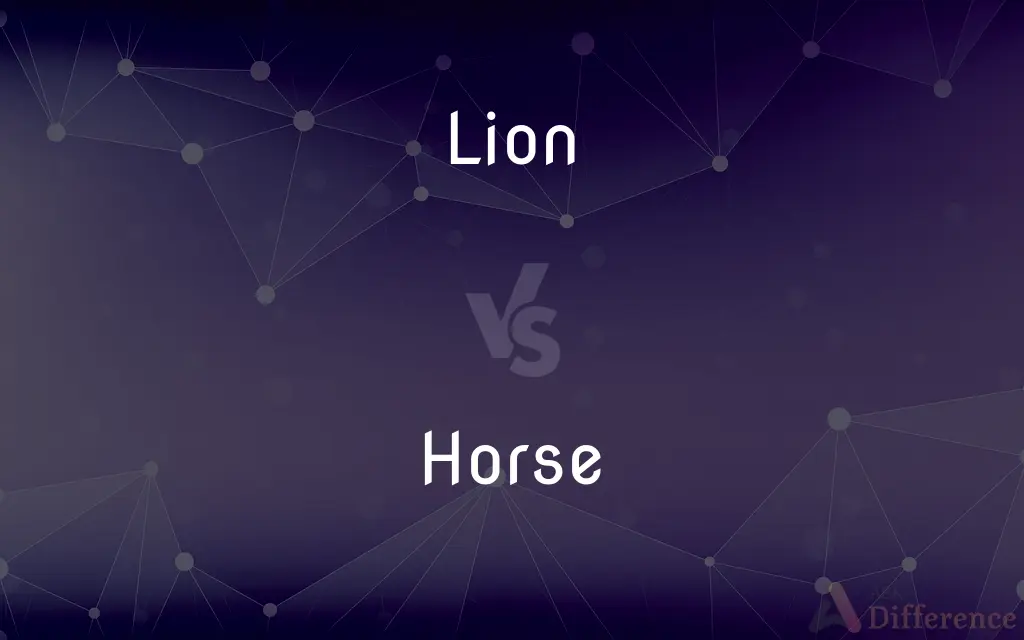Lion vs. Horse — What's the Difference?
By Fiza Rafique & Urooj Arif — Updated on April 16, 2024
The lion, a carnivorous predator known for its strength and mane, symbolizes courage and royalty; the horse, a herbivorous mammal, is renowned for its speed, endurance, and historical role in human transportation and labor.

Difference Between Lion and Horse
Table of Contents
ADVERTISEMENT
Key Differences
The lion, often termed the "king of the jungle," is a powerful predator in the animal kingdom, known for its majestic mane and formidable roar, making it a symbol of strength and royalty. In contrast, the horse is a domesticated herbivore, valued for its speed, strength, and historical significance in transportation and agriculture.
Biologically, lions are carnivores that play a critical role as apex predators in their ecosystems, primarily found in Africa and parts of Asia. They are social animals, living in groups known as prides. Horses, on the other hand, are widespread domestic animals used by humans for riding, labor, and sport, with a history that has significantly shaped human culture and economy.
In terms of behavior, lions are known for their lazy days and active nights, hunting in coordinated groups and relying on the strength of the pride. Horses are highly social animals too, but they exhibit a flight response, making them fast and enduring runners, which has been harnessed for human use in warfare, sports, and work.
Symbolically, the lion represents power, courage, and nobility in various cultures, often depicted as a royal emblem or a central figure in art and folklore. The horse also holds significant symbolic value, representing freedom, grace, and endurance, and plays a prominent role in mythology and history as a symbol of status and warfare.
Physically, lions are muscular with a distinctive mane on the males, which is unique among the big cats. This mane is thought to protect them during fights. Horses are known for their muscular build and impressive stamina, capable of maintaining speed over long distances, which has made them invaluable in human history for transportation and cavalry.
ADVERTISEMENT
Comparison Chart
Diet
Carnivorous (meat-eating)
Herbivorous (plant-eating)
Habitat
Africa, Asia
Worldwide (domesticated)
Social Structure
Live in prides (social groups)
Herd animals, highly social
Symbolic Meaning
Strength, courage, royalty
Freedom, endurance, service
Key Physical Traits
Mane (males), muscular build
Muscular build, built for endurance
Compare with Definitions
Lion
Predatory feline, apex of its ecosystem.
The lion stealthily stalked its prey across the savannah.
Horse
Integral to human sports and activities.
She trained her horse for competitive jumping events.
Lion
Associated with courage in cultural myths.
In many stories, the lion is portrayed as the brave leader.
Horse
Known for its speed and agility.
The racehorse outran all others on the track, showcasing its incredible speed.
Lion
A symbol of strength and royalty.
A lion statue stood at the entrance, symbolizing power.
Horse
Used historically for transportation and labor.
The horse pulled the plow through the hard soil.
Lion
The male of the species, noted for its mane.
The male lion led the pride with majestic grace.
Horse
Symbolizes freedom and endurance.
The sculpture of the horse symbolized the spirit of freedom.
Lion
A large carnivorous wild cat with a mane.
The lion roared loudly, asserting its dominance.
Horse
The horse (Equus ferus caballus) is a domesticated one-toed hoofed mammal. It belongs to the taxonomic family Equidae and is one of two extant subspecies of Equus ferus.
Lion
The lion (Panthera leo) is a large felid of the genus Panthera native mainly to Africa. It has a muscular, deep-chested body, short, rounded head, round ears, and a hairy tuft at the end of its tail.
Horse
A large plant-eating domesticated mammal with solid hoofs and a flowing mane and tail, used for riding, racing, and to carry and pull loads.
Lion
A large carnivorous feline mammal (Panthera leo) of Africa and northwest India, having a short tawny coat, a tufted tail, and, in the male, a heavy mane around the neck and shoulders.
Horse
A frame or structure on which something is mounted or supported, especially a sawhorse.
Lion
A mountain lion.
Horse
A unit of horsepower
A 63-horse engine
Lion
A very brave person.
Horse
Heroin.
Lion
A person regarded as fierce or savage.
Horse
An obstruction in a vein.
Lion
A noted person; a celebrity
A literary lion.
Horse
Provide (a person or vehicle) with a horse or horses
Six men, horsed, masked, and armed
Lion
Lion See Leo.
Horse
A large hoofed mammal (Equus caballus) having a short coat, a long mane, and a long tail, domesticated since ancient times and used for riding and for drawing or carrying loads.
Lion
A big cat, Panthera leo, native to Africa, India and formerly much of Europe.
Tigers and lions share a common ancestor from a few million years ago.
Horse
Any of various equine mammals, such as the wild Asian species Przewalski's horse or certain extinct forms related ancestrally to the modern horse.
Lion
(in particular) A male lion, as opposed to a lioness.
Horse
A frame or device, usually with four legs, used for supporting or holding.
Lion
(by extension) Any of various extant and extinct big cats, especially the mountain lion.
Horse
(Sports) A vaulting horse.
Lion
A Chinese foo dog.
Horse
(Slang) Heroin.
Lion
An individual who shows strength and courage, attributes associated with the lion.
Horse
Often horses Horsepower
A muscle car with 400 horses under the hood.
Lion
A famous person regarded with interest and curiosity.
Horse
Mounted soldiers; cavalry
A squadron of horse.
Lion
A light brown color that resembles the fur of a lion. en
Horse
A block of rock interrupting a vein and containing no minerals.
Lion
(historical) An old Scottish coin, with a lion on the obverse, worth 74 shillings.
Horse
A large block of displaced rock that is caught along a fault.
Lion
Of the light brown color that resembles the fur of a lion.
Horse
To provide with a horse.
Lion
A sign and a constellation; Leo.
Horse
To haul or hoist energetically
"Things had changed little since the days of the pyramids, with building materials being horsed into place by muscle power" (Henry Allen).
Lion
An object of interest and curiosity, especially a person who is so regarded; as, he was quite a lion in London at that time.
Such society was far more enjoyable than that of Edinburgh, for here he was not a lion, but a man.
Horse
To be in heat. Used of a mare.
Lion
Large gregarious predatory feline of Africa and India having a tawny coat with a shaggy mane in the male
Horse
Of or relating to a horse
A horse blanket.
Lion
A celebrity who is lionized (much sought after)
Horse
Mounted on horses
Horse guards.
Lion
(astrology) a person who is born while the sun is in Leo
Horse
Drawn or operated by a horse.
Lion
The fifth sign of the zodiac; the sun is in this sign from about July 23 to August 22
Horse
Larger or cruder than others in the same category
Horse pills.
Horse
A hoofed mammal, Equus ferus caballus, often used throughout history for riding and draft work.
A cowboy's greatest friend is his horse.
Horse
Any member of the species Equus ferus, including the Przewalski's horse and the extinct Equus ferus ferus.
Horse
(zoology) Any current or extinct animal of the family Equidae, including zebras and asses.
These bone features, distinctive in the zebra, are actually present in all horses.
Horse
Cavalry soldiers (sometimes capitalized when referring to an official category).
We should place two units of horse and one of foot on this side of the field.
All the King's horses and all the King's men, couldn't put Humpty together again.
Horse
A component of certain games.
Horse
(slang) A large and sturdy person.
Every linebacker they have is a real horse.
Horse
(historical) A timber frame shaped like a horse, which soldiers were made to ride for punishment.
Horse
Equipment with legs.
Horse
In gymnastics, a piece of equipment with a body on two or four legs, approximately four feet high, sometimes (pommel horse) with two handles on top.
She's scored very highly with the parallel bars; let's see how she does with the horse.
Horse
A frame with legs, used to support something.
A clothes horse; a sawhorse
Horse
(nautical) Type of equipment.
Horse
A rope stretching along a yard, upon which men stand when reefing or furling the sails; footrope.
Horse
An iron bar for a sheet traveller to slide upon.
Horse
A jackstay.
Horse
(mining) A mass of earthy matter, or rock of the same character as the wall rock, occurring in the course of a vein, as of coal or ore; hence, to take horse (said of a vein) is to divide into branches for a distance.
Horse
(US) An informal variant of basketball in which players match shots made by their opponent(s), each miss adding a letter to the word "horse", with 5 misses spelling the whole word and eliminating a player, until only the winner is left. Also HORSE, H-O-R-S-E or H.O.R.S.E. (see H-O-R-S-E).
Horse
(uncountable) The flesh of a horse as an item of cuisine.
Horse
(prison slang) A prison guard who smuggles contraband in or out for prisoners.
Horse
A translation or other illegitimate aid in study or examination.
Horse
Horseplay; tomfoolery.
Horse
(slang) Heroin drug.
Horse
(intransitive) To frolic, to act mischievously. (Usually followed by "around".)
Horse
(transitive) To play mischievous pranks on.
Horse
(transitive) To provide with a horse; supply horses for.
Horse
(obsolete) To get on horseback.
Horse
To sit astride of; to bestride.
Horse
(of a male horse) To copulate with (a mare).
Horse
To take or carry on the back.
Horse
To place (someone) on the back of another person, or on a wooden horse, chair, etc., to be flogged or punished.
Horse
(by extension) To flog.
Horse
(transitive) To pull, haul, or move (something) with great effort, like a horse would.
Horse
(informal) To cram (food) quickly, indiscriminately or in great volume.
Horse
To urge at work tyrannically.
Horse
To charge for work before it is finished.
Horse
A hoofed quadruped of the genus Equus; especially, the domestic horse (Equus caballus), which was domesticated in Egypt and Asia at a very early period. It has six broad molars, on each side of each jaw, with six incisors, and two canine teeth, both above and below. The mares usually have the canine teeth rudimentary or wanting. The horse differs from the true asses, in having a long, flowing mane, and the tail bushy to the base. Unlike the asses it has callosities, or chestnuts, on all its legs. The horse excels in strength, speed, docility, courage, and nobleness of character, and is used for drawing, carrying, bearing a rider, and like purposes.
Horse
The male of the genus Equus, in distinction from the female or male; usually, a castrated male.
Horse
Mounted soldiery; cavalry; - used without the plural termination; as, a regiment of horse; - distinguished from foot.
The armies were appointed, consisting of twenty-five thousand horse and foot.
Horse
A frame with legs, used to support something; as, a clotheshorse, a sawhorse, etc.
Horse
A frame of timber, shaped like a horse, on which soldiers were made to ride for punishment.
Horse
Anything, actual or figurative, on which one rides as on a horse; a hobby.
Horse
A mass of earthy matter, or rock of the same character as the wall rock, occurring in the course of a vein, as of coal or ore; hence, to take horse - said of a vein - is to divide into branches for a distance.
Horse
A translation or other illegitimate aid in study or examination; - called also trot, pony, Dobbin.
Horse
Heroin.
Horse
Horsepower.
Horse
To provide with a horse, or with horses; to mount on, or as on, a horse.
Horse
To sit astride of; to bestride.
Horse
To mate with (a mare); - said of the male.
Horse
To take or carry on the back; as, the keeper, horsing a deer.
Horse
To place on the back of another, or on a wooden horse, etc., to be flogged; to subject to such punishment.
Horse
To get on horseback.
Horse
Solid-hoofed herbivorous quadruped domesticated since prehistoric times
Horse
A padded gymnastic apparatus on legs
Horse
Troops trained to fight on horseback;
500 horse led the attack
Horse
A framework for holding wood that is being sawed
Horse
A chessman in the shape of a horse's head; can move two squares horizontally and one vertically (or vice versa)
Horse
Provide with a horse or horses
Horse
A large domesticated mammal with a flowing mane and tail.
The horse galloped across the field with powerful strides.
Common Curiosities
How do lions communicate?
Lions communicate through vocalizations like roars, growls, and by visual cues and scent marking.
What is the average lifespan of a horse?
The average lifespan of a horse is around 25 to 30 years.
Why are lions considered apex predators?
Lions are considered apex predators because they are at the top of the food chain, with no natural predators.
Can lions be found in a forest?
Yes, lions can inhabit forests, but they primarily thrive in open grasslands.
How are horses trained for competitive sports?
Horses are trained through a combination of conditioning, skill training, and bonding with their handlers.
What are the primary habitats of lions?
Lions primarily inhabit the savannahs and grasslands of Africa, and a small population exists in Asia.
How have horses impacted human history?
Horses have significantly shaped human transportation, warfare, and agriculture through their roles as mounts and labor animals.
Are all lions carnivorous?
Yes, all lions are strictly carnivorous and depend on hunting other animals for food.
What roles do horses play in modern society?
Today, horses are primarily used in sports, recreational activities, and therapy.
Do male and female lions have manes?
Only male lions typically grow manes, which signify maturity and health.
Share Your Discovery

Previous Comparison
Ascribed vs. Prescribed
Next Comparison
Pilau vs. PilafAuthor Spotlight
Written by
Fiza RafiqueFiza Rafique is a skilled content writer at AskDifference.com, where she meticulously refines and enhances written pieces. Drawing from her vast editorial expertise, Fiza ensures clarity, accuracy, and precision in every article. Passionate about language, she continually seeks to elevate the quality of content for readers worldwide.
Co-written by
Urooj ArifUrooj is a skilled content writer at Ask Difference, known for her exceptional ability to simplify complex topics into engaging and informative content. With a passion for research and a flair for clear, concise writing, she consistently delivers articles that resonate with our diverse audience.














































